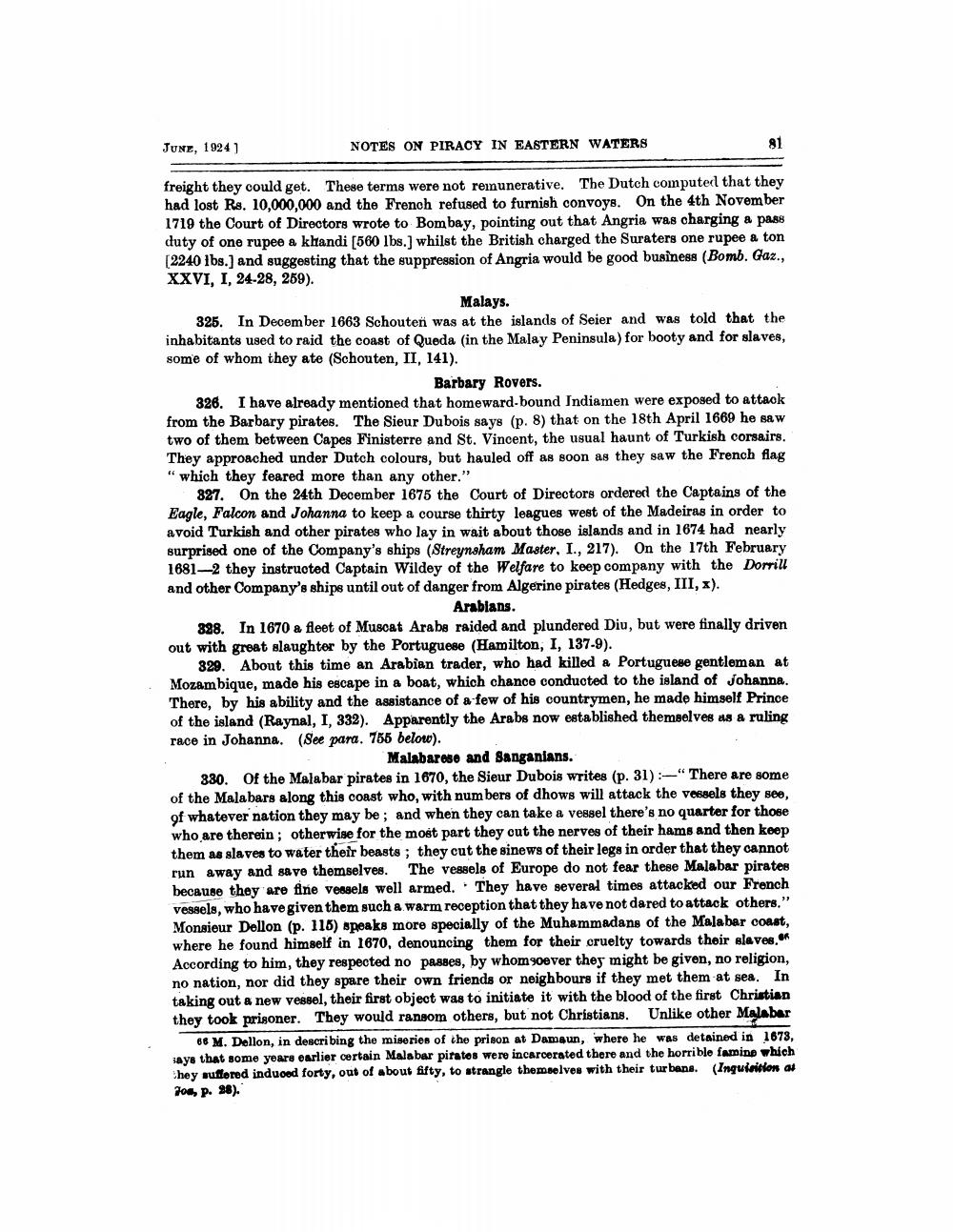________________
JUNE, 1924)
NOTES ON PIRACY IN EASTERN WATERS
freight they could get. These terms were not reinunerative. The Dutch computed that they had lost Rs. 10,000,000 and the French refused to furnish convoys. On the 4th November 1719 the Court of Directors wrote to Bombay, pointing out that Angria was charging a pass duty of one rupee a khandi [560 lbs.) whilst the British charged the Suraters one rupee a ton [2240 lbs.) and suggesting that the suppression of Angria would be good business (Bomb. Gaz., XXVI, I, 24-28, 259).
Malays. 325. In December 1663 Schouten was at the islands of Seier and was told that the inhabitants used to raid the coast of Queda (in the Malay Peninsula) for booty and for slaves, some of whom they ate (Schouten, II, 141).
Barbary Rovers. 326. I have already mentioned that homeward-bound Indiamen were exposed to attack from the Barbary pirates. The Sieur Dubois says (p. 8) that on the 18th April 1669 he saw two of them between Capes Finisterre and St. Vincent, the usual haunt of Turkish corsairs. They approached under Dutch colours, but hauled off as soon as they saw the French flag " which they feared more than any other."
827. On the 24th December 1675 the Court of Directors ordered the Captains of the Eagle, Falcon and Johanna to keep a course thirty leagues west of the Madeiras in order to avoid Turkish and other pirates who lay in wait about those islands and in 1674 had nearly surprised one of the Company's ships (Streynsham Master, I., 217). On the 17th February 1681-2 they instructed Captain Wildey of the Welfare to keep company with the Dorrill and other Company's ships until out of danger from Algerine pirates (Hedges, III, X).
Arabians. 898. In 1670 a fleet of Muscat Arabe raided and plundered Diu, but were finally driven out with great slaughter by the Portuguese (Hamilton, I, 137-9).
829. About this time an Arabian trader, who had killed a Portuguese gentleman at Mozambique, made his escape in a boat, which chance conducted to the island of Johanna. There, by his ability and the assistance of a few of his countrymen, he made himself Prince of the island (Raynal, I, 332). Apparently the Arabs now established themselves as a ruling race in Johanna. (See para. 755 below).
Malabarese and Sanganlans. 330. Of the Malabar pirates in 1670, the Sieur Dubois writes (p. 31) "There are some of the Malabars along this coast who, with numbers of dhows will attack the vessels they see, of whatever nation they may be ; and when they can take a vessel there's no quarter for those who are therein ; otherwise for the most part they out the nerves of their hams and then keep them as slaves to water their beasts; they cut the sinews of their legs in order that they cannot run away and save themselves. The vessels of Europe do not fear these Malabar pirates because they are fine vessels well armed. They have several times attacked our French vessels, who have given them such a warm reception that they have not dared to attack others." Monsieur Dellon (p. 116) speaks more specially of the Muhammadans of the Malabar coast, where he found himself in 1670, denouncing them for their cruelty towards their slaves. According to him, they respected no passes, by whom goever they might be given, no religion, no nation, nor did they spare their own friends or neighbours if they met them at sea. In taking out a new vessel, their first object was to initiate it with the blood of the first Christian they took prisoner. They would ransom others, but not Christians. Unlike other Malabar
66 M. Dellon, in describing the miseries of the prison at Dameun, where he was detained in 1678, says that some years earlier certain Malabar pirates were incarcerated there and the horrible famine which hey buttored induood forty, out of about fifty, to strangle themselves with their turbana. (Inguisition of 104, p. 28).




